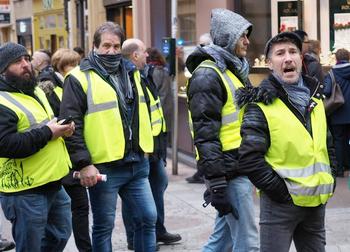
PARIS, France, December 10, 2018 (ENS) – The French government’s proposed hike in the price of climate-warming diesel fuel has set France on fire with the anger of people squeezed beyond what their budgets will bear, even to cool the overheated planet.

In its first attempt to quiet the revolt, the Macron government agreed last week to cancel the planned increase in anti-pollution fuel taxes. But protesters saw the cancellation as too little, too late and went ahead with demonstrations planned for Saturday to push for greater concessions. They held nationwide road blockades and weekend protests in Paris and other cities.
French President Emmanuel Macron Monday declared a “state of economic and social emergency” as he seeks to halt the “yellow vest” rebellion that has sparked violent protests in Paris and other cities throughout France for the past three weeks.
In a 15-minute televised speech from the Elysee Palace, the embattled Macron told the country, “I accept my share of responsibility” for the crisis.
“They have mixed legitimate demands and a chain of unacceptable violence,” said Macron, referring to protesters who defaced the Arc de Triomphe, looted stores along the Champs Elysées and set cars afire along the upscale Grands Boulevards on the weekend.
Nationwide an estimated 136,000 people turned out for the protests, roughly the same number as last week.
Since the start of the street protests, over 4,500 people have been detained by French police, according to police estimates.

The Yellow Vest movement says four civilians have died and more than 1,000 have been injured in the protests.
The grassroots street protests began November 17 with the protest of a fuel tax intended to encourage drivers to stop using climate-warming diesel fuel to run their cars.
Diesel prices in France increased by 16 percent in 2018, with taxes on both gasoline and diesel increasing at the same time and a further tax increase planned for 2019, making diesel as expensive as gas.
Macron said today, “It was first anger against a tax and the Prime Minister has brought an answer by canceling and removing all the increases planned for the beginning of next year, but this anger is deeper, I feel it just in many ways.”
And indeed the French protesters are upset with the Macron government in many ways. They now have a list of 42 demands that range from retirement at 60 to abolishing homelessness.
Their proposals, which they call “People’s Directives,” come from an online poll of an estimated 30,000 people in various yellow vest support groups.
Reactions to Macron’s speech from the “yellow vests” are hard to ascertain as the movement is leaderless and is not affiliated with political parties or trade unions.
But the movement appears to enjoy broad support. Despite 412 arrests and a falling number of demonstrators, a weekend survey shows that 72 percent of the French people surveyed support “les gilets jaunes,” the yellow vests, and just 27 percent support Macron.

Among the measures Macron announced was a 100 euro (US$113 dollar) monthly increase in the minimum wage next year, for which businesses would not have to pay.
Macron also announced he would roll back an unpopular increase in taxes on pensioners introduced by his government.
He called on all businesses “that can afford it” to give employees a one-off “end of year bonus” which would then be tax free.
In another move to appease the protesters, Macron said he would do away with all wage taxes on overtime work.
The Yellow Vest movement started online in May 2018 and led to street demonstrations that began in France on November 17, and spread to Wallonia, a industrialized part of southern Belgium.
The Yellow Vests now exist in seven countries: Belgium, Canada, Greece, Montenegro, Netherlands, Sweden, and, of course, France.
Copyright Environment News Service (ENS) 2018. All rights reserved.
© 2018, Environment News Service. All rights reserved. Content may be quoted only with proper attribution and a direct link to the original article. Full reproduction is prohibited.
